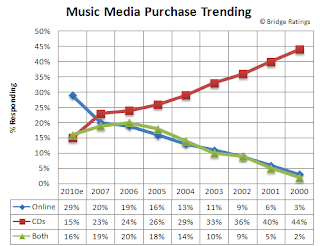
as someone who arrogantly and wrongly has accused whole industries of "not getting it" at points in the past, I never like to presume I understand executive thinking better than they themselves do.
What sometimes appears as "cluelessness" often has more to do with deliberate timing. and rational calculations about how long to let one revenue model atrophy before heating up a replacement revenue model that will cannibalize the older model.
So let me be charitable. Perhaps U.S. music executives do have a plan for changing their business model and packaging. Perhaps they are executing on that plan even now.
Album sales declined 9.5 percent last year, while digital song sales grew 45 percent, according to Nielsen SoundScan. Physical product sales were down 15 percent, including sales of "singles."
So maybe the issue is simply figuring out better ways to handle digital rights that aren't unfriendly to consumers who have paid for their music, nor damaging to copyright holders. It's a tough problem, to be sure.
And the problems extend far beyond copyright issues. As someone who has made a transition to iPod as my primary music playback system, and as someone whose PC-embedded hard drives need to be replaced once a year or so, the issue of storing and managing the music collection is a serious problem.
The reason, of course, is that each iPod syncs with just one hard drive. Lose that hard drive and one has two options: completely erase the contents of the iPod, or never change the data already on the iPod.
So now I have to take two paths to make sure the music isn't lost: store the copies on an external hard drive that hopefully "never" dies; and then keep the compact disk as well, since the external hard drive will ultimately fail, forcing me to restore or simply forget about the music stored on it.
As a simple music customer, this is a problem. Unless I have physical media backup, the music always is at risk of loss, for mechanical reasons. But keeping those CDs is not ideal, either. And the process of restoring lost music is time-consuming. So music storage "in the cloud" seems promising, at least to me.







